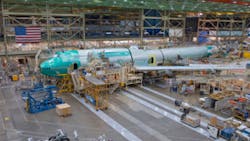Boeing Commercial Airplanes announced is curtailing the production rate for its 747-8 jets, from 1.75 airplanes to 1.5 airplanes per month through 2015. The OEM cited decreased market demand for large passenger and cargo airplanes.
The Boeing 747-8 is a wide-body, four-engine airliner, the fourth generation of the 747 series that entered service in 2010. It is the largest aircraft in the 747 series, the largest U.S.-built commercial jet, and the longest passenger aircraft in the world.
The planes are built at Boeing’s assembly plant in Everett, Wash.
The change in demand may be an early indicator of that Boeing made a correct decision by emphasizing more fuel-efficient, twin-engine commercial jet, including the new version of the 737 and the 787 Dreamliner.
Boeing’s long-term forecast sees average growth rates in the air cargo market resuming in 201. It pegged the global demand for large airplanes (such as the 747-8) over the next 20 years at 760, carrying a value of $280 billion.
"This production adjustment better aligns us with near-term demand while stabilizing our production flow, and better positions the program to offer the 747-8's compelling economics and performance when the market recovers," stated Boeing’s Eric Lindblad, vice president and general manager for the 747 Program. "Although we are making a small adjustment to our production rate, it doesn't change our confidence in the 747-8 or our commitment to the program."
The first jet deliveries at the new production rate will take place early in 2014, and Boeing indicated that the change would not have “a significant financial impact.
About the Author
Robert Brooks
Content Director
Robert Brooks has been a business-to-business reporter, writer, editor, and columnist for more than 20 years, specializing in the primary metal and basic manufacturing industries.
